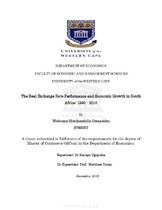The real exchange rate performance and economic growth in South Africa: 1990 - 2016
Abstract
This study estimates the impact of the real exchange rate’s performance on economic growth in South Africa from 1990 to 2016 based on quarterly data. A review of the literature reveals that the real exchange rate can have either a positive or a negative effect on economic growth. The empirical analysis began with testing for stationarity of the variables by applying the Augmented Dickey-Fuller (ADF) and Phillips Peron (PP) tests. This was followed by the co-integration test of the model.
The unit root test results show that all variables except the exchange rate were integrated at order one, that is I (1), while exchange rate volatility is integrated at order zero that is I(O). Also, the co-integration analysis indicated that variables are co-integrated. Employing the Vector Error Correction Model (VECM) technique to estimate the results, the relationship between real exchange rate and economic growth was estimated. Findings further show that in the short run, economic growth is positively responsive to the real exchange rate while in the long run, a negative relationship exists between the two variables.
The results in the short run suggest that the exchange rate hurts economic growth. A 1% point increase in the real exchange rate (RER) causes a reduction in economic growth by 379 per cent. A rise in the RER affects the trade balances between exports and imports, which results in more imports in the country than exports and the devaluation of the rand stipulates imports in the short run, which leads to the gross domestic product to increase.
The study recommends that the South African Reserve Bank (SARB) Monetary Committee, together with the South African government, should develop a policy that will pursue a prudent monetary policy. A stabilise real exchange rate will enhance the economic activities that will attract foreign direct investment (FDI) and create an environment conducive to investment that will boost economic growth of South Africa.

